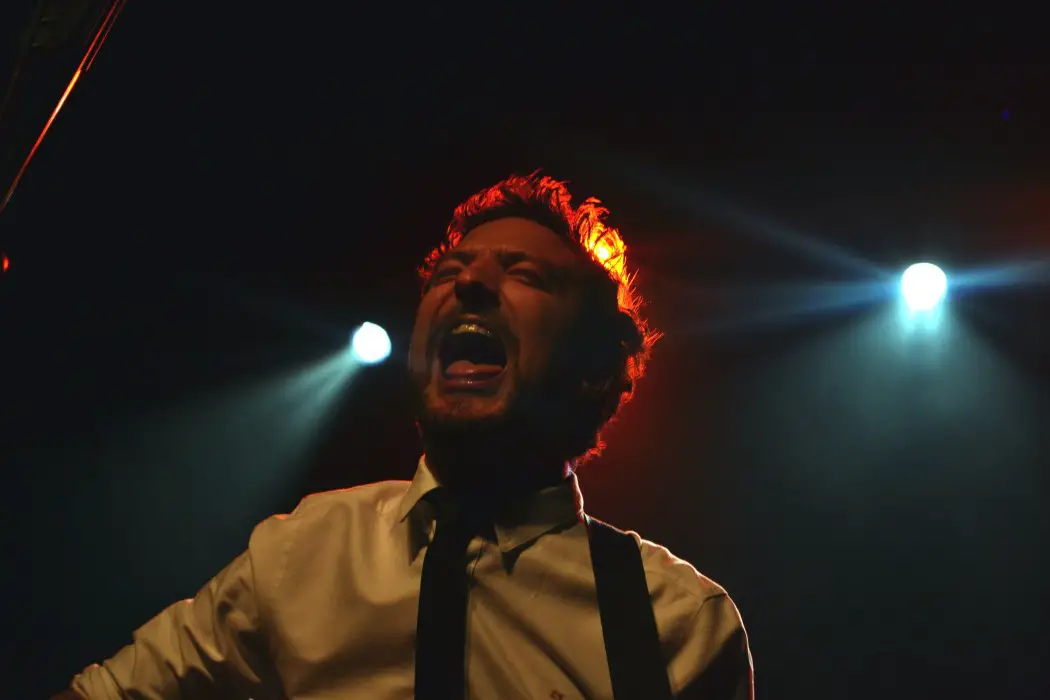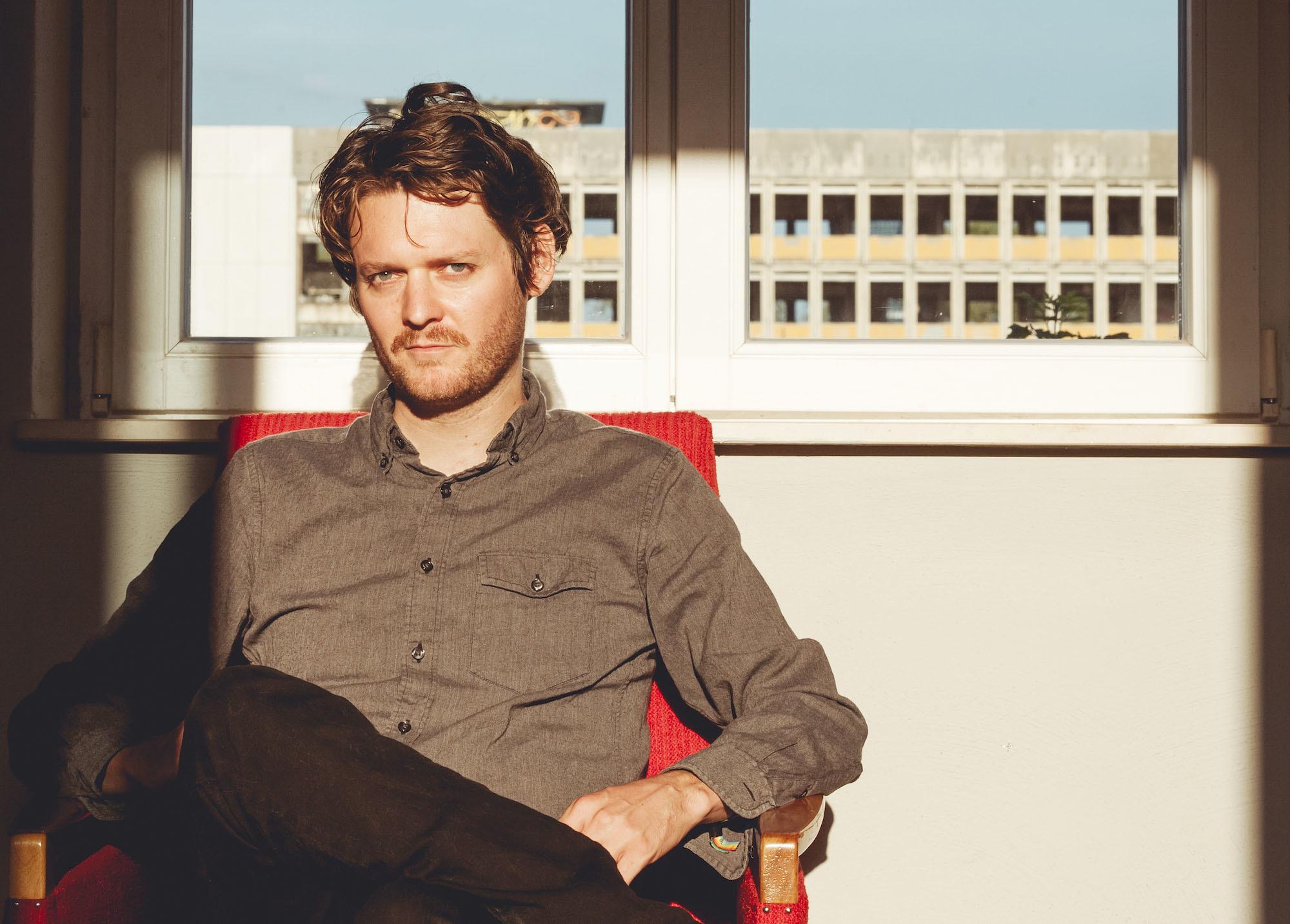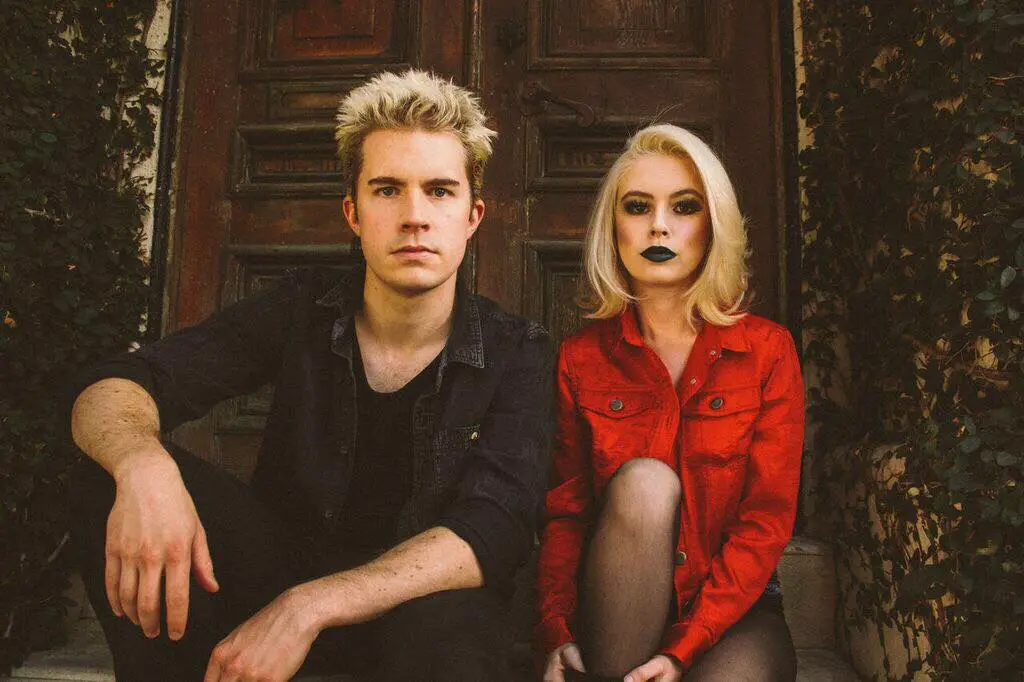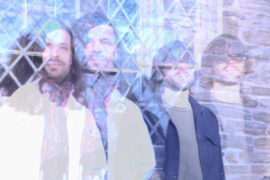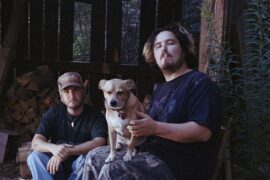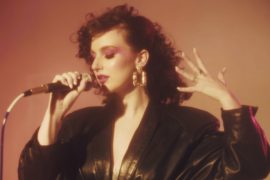No one at a Frank Turner concert is having more fun than Frank Turner: With ten years as a solo artist and six studio albums under his belt, the British guitar-slinger exudes an unmatched passion for his work both on and off the stage. Turner’s distinctive “singer-songwriter” music, much of which does begin with a notepad and an acoustic guitar, draws influence from as far-reaching worlds as folk and punk, and it continues to grow richer and more colorful with each successive record. Avid listeners can trace Turner’s personal, musical and lyrical development over time – from 2007’s acoustically explorative, angst-riddled debut Sleep Is for the Week, to 2015’s confident, dynamic and proclamatory Positive Songs for Negative People and beyond – yet no matter where you look in Turner’s extensive and impressive decade-long discography, one key characteristic remains constant: Sincerity.
“I try to do things that I love,” says Turner while explaining why he believes his favorite album should theoretically always be his most recent one. “Actually, it’s ridiculous for me to pick favorite records of my own, because they’re all way too intimately involved in my life.” Turner isn’t an open book, but he also doesn’t play games; the moniker Frank would be fitting regardless of his first name being Francis. Midway through a thought-stream he mentions, “I write autobiographically and chronologically.” That candid, matter-of-fact admission holds more weight than Turner likely realizes. An honest extension of the man himself, Turner’s music provides an intimate glimpse into his world and his psyche. It’s an attractive and compelling factor that makes his music shine brightly and allows him to stand out as an artist.
Listen: “Josephine” – Frank Turner
[soundcloud url=”https://api.soundcloud.com/tracks/259103227″ params=”color=ff5500&auto_play=false&hide_related=false&show_comments=true&show_user=true&show_reposts=false” width=”100%” height=”166″ iframe=”true” /]

For truly, few artists are as brutally honest as Frank Turner; few singer-songwriters channel their personas so seamlessly into their music. A pragmatic intellectual (though he’d likely be last to admit it), Turner creates complex (but digestible) worlds of musically-charged emotion and emotionally-charged music. He ‘tells it like it is,’ yet like the music of Bruce Springsteen or Billy Joel, there’s far more going on in each song than meets the eye. No matter how he gets there, Frank Turner somehow always makes it look easy.
Positive Songs for Negative People – a deceptively clever title, if ever there was one – is Frank Turner’s latest album, released in August 2015 via Xtra Mile Recordings. Critics and fans have celebrated Positive Songs as among Turner’s most ambitious projects to date; the album has an air of freedom and an unrestricted sense of purpose as Turner intermingles unabashed rock with lighter acoustic sounds. The followup to 2013’s Tape Deck Heart, a “breakup record from the point of view of the bad guy,” Positive Songs is “about surviving the crash, rather than about the crash itself.”
Authenticity rings throughout the record – a nod to its organic development: The songs were written and rehearsed in a live context over two years’ worth of touring, structured and restructured until Turner and his band, The Sleeping Souls, were fully satisfied. Turner wanted to make Positive Songs the way that “bands make debut albums” in a live context – so that the “recording part of it is capturing a snapshot of something that’s already happened.” Indeed, despite its raucousness and an occasional rough-around-the-edges feel, Positive Songs is a cohesive unit that feels tied to a specific time and place – namely, Turner’s renewed stability, a new-found sense of self, and a palpable drive for life. One listen to the song “Get Better” is all one needs to grasp the mess of feelings within Turner’s head:
I’m trying to get better because I haven’t been my best
She took a plain black marker, started writing on my chest
She drew a line across the middle of my broken heart,
And said: “Come on now, let’s fix this mess”
We could get better
Because we’re not dead yet
Frank Turner is deeply personal yet wildly accessible; it’s easy to feel connected to him – to simultaneously experience his songs through one’s own lens and through his.

After what feels like the culmination of a long and arduous story arc, Frank Turner feels like he’s hit a turning point – though he doesn’t know what that turn will be just yet. “I’m currently on a self-imposed ban on writing,” he tells me. It’s the first time he’s done this, and it sounds like it’s his way of trying to broaden his musical horizons and give everything a good shake-up. The Mittens EP, a five-song set stemming from the Positive Songs “sessions” and released in March, effectively concluded this chapter in Turner’s musical career. Now what?
One can only speculate. Says Turner, “I’m interested in looking at some stylistic left-hand turns for whatever I do next.” Transformation is a good thing, and it’s important for an artist to consciously take time in figuring out that “next direction.” Considering he’s been listening to everything from bluegrass and traditional country music, to 1960’s garage punk and progressive techno music, that left-hand turn could come in any number of unexpectedly appealing ways. One thing is certain though: Regardless of what the music sounds like, Frank Turner will bring his full self into it. His sincerity is ingrained in his person.
There’s no better way to peek under the hood of an artist than by watching him listen to his own material. Long before he released Positive Songs for Negative People, Frank Turner hosted a small album listening session in Midtown Manhattan. No more than 25 people were in attendance, and after introducing the album and its background, Turner played his record, occasionally pausing between songs to tell a story or provide further context. There was a glimmer in his eyes as he described the experiences that inspired different songs.
When we met again at the end of the year, I was driven to press Frank further – to learn as much as I could about him, the person/artist/performer. Honesty is one of Frank Turner’s greatest assets, and I definitely took advantage of that as we discussed his philosophy about music, his aspirations, and much more. Get to know Frank Turner through our exclusive interview, and don’t miss him on his extensive North American tour this summer. Turner is as much a delight to chat with as he is to watch perform. Music is his life; the urge to make and perform music flows through every fiber of his being. Just remember: No matter how great a time you have, no one at a Frank Turner concert is having more fun than Frank Turner.

A CONVERSATION WITH FRANK TURNER
Atwood Magazine: How's it going, Frank? Great to meet you!
Frank Turner: Good – yeah, it’s very nice to meet you, man! How’s life?
Life is going alright... Last time I saw you, actually, was at the Gibson Showroom!
Frank Turner: Oh, the listening party thing that we did?
It was a while back.
Frank Turner: I was there today, actually – funnily enough, doing something else… But yeah, that was fun!
One thing I noticed during the album listening session was that you never turned around to face us while we were listening to your new album.
Frank Turner: [laughs] Well – okay, yeah. The reason for that is that, is there anything worse in this world than someone playing you their record, and then staring directly at you, and being like what do you fucking think, man? I wanted you guys to just enjoy it or not enjoy it, or whatever it is you were going to do, without me trying to eyeball you about it.
Don't you do that every night?
Frank Turner: Yeah, but that’s performing the songs and playing them live – that’s different… Although that’s a good question. I don’t know; I know a lot of musician types, and I know some guys who – put it this way: There are some kind of guys who will get to the house party and put their own fucking record on, and I hate those people and don’t want to be one of them. I would never put my own songs on at a party, like ever.
I mean, Frank, you're a showman.
Frank Turner: Yeah, but – okay, okay. Everyone who’s here tonight bought tickets to see me play a show.
That's true.
Frank Turner: You know what I mean? So, I’m going to do that.

I'm kind of curious about your mindset going from Tape Deck Heart into Positive Songs. 2013: You put out this great record -
Frank Turner: – thank you –
- you played a fuckton of shows, and now you came back with this.
Frank Turner: The first thing to bear in mind is the time lag inherent in the music industry. I started writing songs for Positive Songs before Tape Deck Heart was released. You finish the record, you master it, and when you’ve got the listening session, you get your final ‘this is the final songs’ thing. That’s kind of the end of the chapter, as far as the musical side of the creativity goes, in terms of writing and recording. Obviously you do artwork and do photo shoots and you do press and you do promo and you do [rattles his head], and obviously touring a lot, as well – all of which is well and good – so there’s an inherent six months to a year, at least, time lag.

Tape Deck Heart was largely about a collapse in my personal life that I was entirely responsible for. I had this idea of writing a breakup record from the point of view of the bad guy, because I love breakup records – I feel like they’re a sub-genre to themselves. But almost all of them are written from the point of view of the victim, you know? That means there’s an awful lot of records that have gone unwritten [laughs] historically. I mean, like – do you know Esmé Patterson? She actually sang on Positive Songs – she sings on [“Silent Key”] – she wrote a great record recently that was like ten, or maybe twelve songs written from the point of view of the woman involved in famous songs. She wrote a song from Jolene’s point of view; she wrote a song from Billie Jean’s point of view, all of this kind of thing. I thought it was such a good idea for an album! Anyway – so the main kind of mindset thing for this record was kind of relief, almost – I want to say – because the making of Tape Deck Heart was a very cathartic thing for me. Not a particularly easy, or pleasant, or fun time – and then it was done! And not only was the music done, but I’d also reached peace with myself over the things that had happened, and so Positive Songs is a record about surviving the crash, rather than about the crash itself.
‘Positive Songs’ is a record about surviving the crash, rather than about the crash itself.
And that was written roughly around the same time that everything else was going on, and coming out?
Frank Turner: So, this is the next thing! There’s methodology in here as well. Tape Deck Heart was a record where quite a lot of it came together in the studio and we spent a lot of time in the studio – which is all well and good – but with this record, I wanted to make it like bands make debut albums, which is that you have the songs written and rehearsed in a live context, and the recording part of it is capturing a snapshot of something that’s already happened. So with that in mind, we built a monitoring rig from stage, which means we don’t need to sound-check every day (as in play the kick drum, play the snare drum and shit), so basically every day for the whole of the Tape Deck Heart tour we had two hours a day to play new material. I wrote the songs, and then me and the Souls started working on them. Somebody sent me footage the other day of us playing “Get Better” before Tape Deck Heart came out, but in a completely whack arrangement of it! We obviously then kicked it around for like two years before we got it right.
I wanted to make [Positive Songs] like bands make debut albums, which is that you have the songs written and rehearsed in a live context, and the recording part of it is capturing a snapshot of something that’s already happened.
So these songs that came out recently and that you're playing every night now, these are songs that you were honing for two to three years prior.
Frank Turner: Yeah.
You said before that this album is special to you in different ways in the past; aren't all albums, at the time of their release, special?
Frank Turner: Yes, of course! We’re now a month and a half out from the release of it, but even now, if you ever get asked the question What’s your favorite record?, if the answer isn’t “My most recent one,” then I haven’t done my job properly. Obviously that will change over time – and actually, it’s ridiculous for me to pick favorite records of my own, because they’re all way too intimately involved in my life! Trying to compare things I did when I was twenty-three to things I’m doing when I’m thirty-three, it’s sort of meaningless…
Have you always found that you've been in love with the thing that you're doing right at that moment?
Frank Turner: I think I would phrase it slightly differently, and say I try to do things that I love.

Have you always had these prolific spurts of creating and creating and creating?
Frank Turner: This is an interesting time for you to ask that question, because until recently, my songwriting thing – since I first started trying to write songs with an acoustic guitar – has been a pretty steady stream. And the process of making records has been a case of sort of putting dams in the stream, and trying to create coherent chunks of songwriting. It’s artificial to a degree – I mean, I write autobiographically and chronologically… Since finishing Positive Songs, I don’t want to go too far down this road because it’s too early to say with any degree of certainty, but it felt to me like a wrapping up of a certain musical phase, to me, in a way, and I’m currently on a self-imposed ban on writing. That’s putting it slightly strongly – what I mean is, I’m not allowing myself to worry about whether or not I’m writing songs at the moment, and I’m not writing songs right now, partly because we’ve got so many fucking songs to choose from in the set-list right now already [laughs], and you know, I’ve done six records in ten years – that’s fast! And there’s three albums’ worth of rarities in there, too, so that’s a lot of songs – but also, I’m interested in looking at some stylistic left-hand turns for whatever I do next. Having said that, I have never really forced what I do stylistically, and I don’t particularly want to start now, but I’ve been taking guitar lessons for bluegrass guitar lately, which has been fun, and I’ve also been listening to a lot of progressive techno stuff lately, and a lot of soul and Elvis, and I’ve been listening to, like, world music. I’m currently trying to spread it all out there, in terms of my tastes.
That's totally fine - you never had a specific trajectory you were headed toward in the first place. I mean, you changed your entire career!
Frank Turner: Right, totally. The experience of going from being in an underground successful punk band, to then no one giving a fuck, to now doing what I’m doing now, it sort of means that it’s a fool’s errand to predict what’s going to happen in the future. Also, it kind of misses the point, because the unexpectedness of it is the fun part, in a way. You know what I mean? Occasionally someone asks, “If you could go back and tell your fifteen-year-old self something, what would you tell him?” And it’s like, “Nothing! That motherfucker’s got it all coming down in a barrel, man!” Actually, the one thing I would say would be to do a little bit more stretching before playing shows so that your fucking back doesn’t go out halfway through your career – but other than that, at the risk of sounding totally hippie – but it’s like, the journey is the interesting part.
Well it just means that you're not a songwriter for songwriting's sake.
Frank Turner: This is my major form of creative expression in life, you know? In fact – okay, let’s rephrase that, my only form of creative expression in life, because I can’t draw to save my fucking life. Songwriting and performing are the things that I do, and in a way I would say they are ends in themselves, but like… ‘Cause that’s the thing, it’s part of the reason I got sick of politics in the music business. Something I really hate is people using music as a means to an end. To me, music is the end: It’s the end in itself, and I almost feel defensive of music once it gets to, “Oh, I wrote these songs to change the world.” Fuck that! Right? They’re songs to be songs. If they then change the world, fuckin’ a! Crack on. But don’t fucking use music as a climbing frame to reach something else.
[Music] is my
majoronly form of creative expression in life.
Watch: “The Next Storm” – Frank Turner
[youtube=https://youtu.be/P4IZbCl6iR4?t=0s]
Do you believe that you, as an artist, have a social responsibility that goes beyond delivering music?
Frank Turner: No, not at all. My responsibility is to be the best musician that I can and to do the best shows that I can, that I am charging people money to get into, and to make the best records that I can. If I choose to have social responsibilities beyond that – and in some ways I do, and in some ways I don’t – then that’s my prerogative, but any one artist telling any other artists what they should or shouldn’t be doing, outside of trying to make the best music they can, is a pretty naff sight, I think.
Let's do a complete tangent now. What's the one instrument you always tried to play, but you never could?
Frank Turner: Well, there’s sort of two answers to that. I’m really quite bad at the piano – there’s a couple of songs I can hold down at the piano; I always wished I was better at the piano, and it’s laziness probably more than anything else. I got a piano in my flat in London, thinking “I’m gonna learn! Osmosis! It’ll be there, I’ll play it the whole time,” and then I’m never there, so that didn’t help. I always had this idea that it would be amazing to play the fiddle. There’s a guy called Seth Blakeman from the UK – he’s a folk artist I’ve done some touring with – who’s amazing. He plays guitar, but he also does a lot of songs with fiddle and vocals, which is amazing! I’ve always thought that would be a wonderful feather in my cap, if you like. But the fiddle is not an easy instrument to learn; you just make awful noise for quite a long time, so I’ve never got anywhere close to learning to play.
Sticking to the guitar for now?
Frank Turner: Hmm. Yeah… As I said, I’ve been taking lessons on bluegrass stuff lately off a friend of mine. I’m not that particularly virtuous on guitar by any stretch of the imagination, but I like the idea of improving on guitar.
One thing I like about the guitar is that there is versatility, even there. Jimmy Page would always go into these weird tunings and somehow make amazing things.
Frank Turner: I’m gonna sound like I’m gonna fart in my own corner here, because I am, but rhythm guitar is an unsung discipline. Most people who talk about guitar spend their life talking about lead guitar playing, but AC/DC are nothing without Malcolm Young. I like to think I’m a reasonable rhythm guitar player! The moment I actually realized that I might not be a terrible guitar player overall is when I injured my back. The doc said I could keep touring, but I wasn’t allowed to play guitar for a time. My fill-in was my guitar tech, who’s a very old friend and, on a purely technical level, a better guitarist than me – he can rip leads and all this kind of thing. As far as I’m concerned, I play simple chords and simple rhythms, and it took him a long time to nail my parts, because there’s quite a lot of nuance in the rhythm of it. I was like, “Dude, it’s just that! It’s really fucking easy,” and he was like, “Dude, that is not easy, what the fuck are you talking about?” and it was kind of nice, in a way, to go Oh, maybe I’m not terrible!

Have you had any other of those 'a-ha' moments recently?
Frank Turner: uhh…
We're here for three sold-out nights in New York City...
Frank Turner: Yeah, that’s pretty a-ha, umm… I found out the other day that – okay, I had an ‘a-ha’ moment… This is gonna sound like I’m a moron, because I am… That Jacob Dylan is Bob Dylan’s son! It just never occurred, and then it was like, “Oh yeah… obviously!” And now I feel like a moron. What’s the other one that I found out? Nic Cage is related to someone, isn’t he? His name isn’t Nic Cage, it’s something else… And he’s like, related to Emilio Estevez or something… I’m the wrong person to talk to about this.
You're thinking of Charlie -
Frank Turner: Sheen! No, but Nic Cage is related to somebody else in Hollywood, and his surname isn’t really Cage; it’s something else. Google it. It made me go, “Fucking really?! Wow!” So. That was my ‘a-ha’ moment.
From Wikipedia: "Nicolas Kim Coppola (born January 7, 1964), known professionally as Nicolas Cage, is an American actor and producer... Through his father, he is a nephew of director Francis Ford Coppola and of actress Talia Shire, and the cousin of directors Roman Coppola and Sofia Coppola, film producer Gian-Carlo Coppola, and actors Robert Carmine and Jason Schwartzman."
So this record, these songs... What was the hardest song for you to write on Positive Songs?
Frank Turner: Well, there’s more than one way of interpreting the word “hard.” The hardest song to write, in terms of just getting the song right and fucking around with structuring and that sort of thing, was the song “Demons.” It took me forever to get the riffs in the right order and get the arrangement right, and there’s a gazillion different versions of that song lying around… The hardest song, emotionally… “Song for Joshua” was not an easy song to write or record in some ways, but it didn’t take very long; I just had to push myself to be raw with it.
Positive Songs for Negative People as a name...
Frank Turner: … Has more of a tongue in its cheek than some people seem to think. I’m not saying it’s a joke of a title, in any way, but like, some people take it in an extremely po-faced way, and it’s like, Come on, man. There were some people, when you’re a kid, who understood that listening to sad songs made you feel better, and some people who didn’t.
There were some people who understood that listening to sad songs made you feel better…
This record is up and down; it's kind of all over the place, thematically.
Frank Turner: Yes. Okay, I’ll take that as a compliment!
It kind of almost feels like a little bit of ADD, though.
Frank Turner: Yeah, well, I mean it’s not a concept album, I suppose would be my response to that. Each song is hopefully internally coherent. England Keep My Bones wasn’t a concept record, but there were a fair few songs that were sort of about England on that. Tape Deck Heart wasn’t a concept album, but there were a fair few songs that were about breakups on there. I would say a similar thing about this one – it’s not a concept record, by any stretch of the imagination – but there is a… I was going to say “theme,” but that’s the wrong word. There’s just a vibe, I think, of the idea of attempting to be optimistic in the ruins, which runs through it. Arguably, “Get Better” and “Love Forty Down” are about reasonably similar things, but one of them is told through the matter of tennis, and one of them isn’t.
I do like that tennis metaphor.
Frank Turner: Thank you. Some people seem to think it’s fundamentally ridiculous, and I think they have no sense of humor.
Were you thinking of different sports when you actually wrote that one out?
Frank Turner: No, no, I was actually doing some post-show physiotherapy in Norfolk, Virginia of all places, and the guys from Smith Street Band, this folk band, were playing ping pong over my head, and one of them shouted out a score, which was “Love something down,” and it just stuck in my head as an interesting phrase. And then, of course, it occurred to me that Love-Forty-Down is break point, and I thought, “Okay, there we go.” Now we have the bare bones of a song.
It's interesting, the way that these things come to you. It doesn't feel like there's any one way that you approach songwriting.
Frank Turner: Songwriting is a pretty vague process for me, in the sense that I don’t have a methodology. I’m not really able to say much about it, not because I don’t want to, but because I don’t have the vocabulary for the process, and I almost can’t quite remember the process quite a lot of the time. I can remember song not existing and then songs being finished; I can’t quite remember how it got from one to the other. Like a sleepwalker.
What song are you proudest of on this record? The way that I'm going to phrase that is, if somebody were just discovering Frank Turner's music for the first time ever and listened to this record, which is the one song you'd really want to stick out?
Frank Turner: That’s two separate questions, you see. If somebody was listening to my stuff for the first time, I would have to want to play something that was representative of my oeuvre overall. I’d probably play them “Get Better” because I love that song a lot and I’m very pleased with that song. The song I’m proudest of, probably, is “Silent Key,” because I think that it’s a little bit of a stylistic departure for me, and it’s a kind of lyrical idea that took a long time to get right and to present in a way that was both engaging and sensitive. It was really a pain not to sound blasé about this subject.
Were you writing a lot of songs at the same time that ended up not making it onto this particular record?
Frank Turner: There’s a handful, but to be honest, for a song to get to the point of actually being finished for me, quite a lot of the editing process takes place before that – as in, I’ll get a verse and chorus into something and go, this is bullshit, or quite often, I’ll have two or three attempts at the same subject matter, lyrically, or I’ll have two or three musical attempts with the same vibe, and one becomes the clear one. There’s three songs that we’re going to put out on an EP sometime soon, that were finished for this record and that I like, and that I’m not going to do anything else with. There’s a fair few half-songs which I think will be good once I figure out what I’m supposed to do with the middle eight… We’ll see.
So you've been listening to other music these days?
Frank Turner: Yeah, I’ve been trying to spread my wings a little. Mainly trad country lately, actually; I’ve been listening to tons of George Jones, Loretta Lynn – that kind of vibe. “Trad” like proper seventies era, for me. That music doesn’t occupy the same kind of cultural space in England as it does in America. We don’t have country radio; it’s not that big in the UK, so I’d never heard of George Jones until a couple of years ago, and now I can’t really listen to anything else. Outside of that, I’ve been listening to quite a lot of ’60s garage punk stuff, which, again, is quite new to me.
So the next proper record really could go in any direction.
Frank Turner: You know what I’m doing right now? I’m quite enjoying not having to have an answer to that question just yet; it’s quite liberating.
Ten years, six albums. You ever feel like taking a break for a hot sec?
Frank Turner: I do, and then I come up with other ideas. I did have an idea of possibly taking a year and just touring weird places. I had a friend who said he could set me up a tour through central Russia, and then like Central America, the Far East – cut out [North] America and Europe from my tour schedules for a year. That would be kind of fun!
Just go away in a different sense, still doing what you love.
Frank Turner: I would imagine that would give me a fair amount of shit to write about.
Did you always want to be a touring musician?
Frank Turner: Yes, since I was about ten. I never really gave a thought to anything else since, much to my parents’ dismay.
Do you have any favorite lyrics from these new songs? It's a really cheesy question, but I wrote it down, so let's go with it.
Frank Turner: Yeah – I hate to say yes to that question, because somehow, in my head, I think I should be more egalitarian. There’s a lyric in “Josephine” – my favorite set of words on the new record is “Josephine,” because I find it quite difficult to explain what that song is about in prose, which is good, because it means it needs to be poetry, right? There’s a line in there –
Let’s pretend it’s Halloween
You come as a car crash
I’ll go as James Dean
– which I’ve kind of had in my back pocket for a little while, and it’s been looking for a home – and it got one.
“Josephine” – Frank Turner
[youtube=https://youtu.be/STRG4tOUARw?t=0s]
“Get Better” – Frank Turner
[youtube=https://youtu.be/tB4Avdlz3lk?t=0s]
Connect with Frank Turner on Facebook, Twitter, Instagram
Discover more new music on Atwood’s Picks
Frank Turner 2016 Tour
5/21 – Dallas, TX @ Elm Street Festival
5/22 – Little Rock, AR @The Metroplex
5/23 – Columbia, MO @ The Blue Note
5/24 – Des Moines, IA @ Woolys
5/26 – Grand Rapids, MI @ The Intersection
5/27 – Columbus, OH @ Newport Music Hall
5/28 – Louisville, KY @ Mercury Ballroom
5/29 – Knoxville, TN @ The Concourse
5/31 – Memphis, TN @ New Daisy Theater
6/1 – Oklahoma City, OK @ Diamond Ballroom
6/3 – San Antonio, TX @ The Aztec Theater
6/4-5 – Houston, TX @ Free Press Summer Festival
6/5 – New Orleans, LA @ The Joy Theater
6/6 – Mobile, AL @ The Soul Kitchen
6/7 – Birmingham, AL @ Iron City
6/9 – St Petersburg, FL @ Jannus Live
6/10 – Ft Lauderdale, FL @ Revolution
6/11 – Orlando, FL @ Beacham Theater
6/12 – Atlanta, GA @ The Tabernacle
6/14 – Cincinnati, OH @ The Taft Theatre
6/15 – Cincinnati, OH @ The Taft Theatre
6/16 – Buffalo, NY @ Canalside Concerts *free
6/17 – Philadelphia, PA @ Penn’s Landing
6/18 – Columbia, MD @ Merriweather Post Pavillion
6/19 – Gilford, NH @ Bank of NH Pavilion
6/21 – Richmond, VA @ Altria Theatre
6/22 – Norfolk, VA @ Chrysler Hall
7/29 – Chicago, IL @ Lollapalooza Festival
7/31 – Portland, OR @ Oregon Zoo Amphitheater
8/1 – Seattle, WA @ Showbox SoDo
8/3 – Oakland, CA @ Fox Theatre
8/4 – Paso Robles, CA @ Vina Robles
8/5 – Santa Ana CA, @ Observatory
8/6 – San Diego CA, @ CalCoast Open Air
8/8 – Morrison CO, @ Red Rocks Amphitheater
8/9 – Papillion, NE @ Sum Tur Amphitheater
8/10 – Minneapolis, MN @ Cabooze Plaza
8/12 – Whites Creek, TN @ Carl Black
8/13 – Detroit, MI @ Freedom Hill Amphitheater
8/14 – Cleveland, OH @ Jacob’s Pavilion
8/16 – Portland, ME @ Maine State Pier
8/18 – Wallingford, CT @ Toyota Oakdale
8/19 – BK, NY @ Coney Island Amphitheater
8/20 – Asbury Park, NJ @ Stone Pony Outdoor

